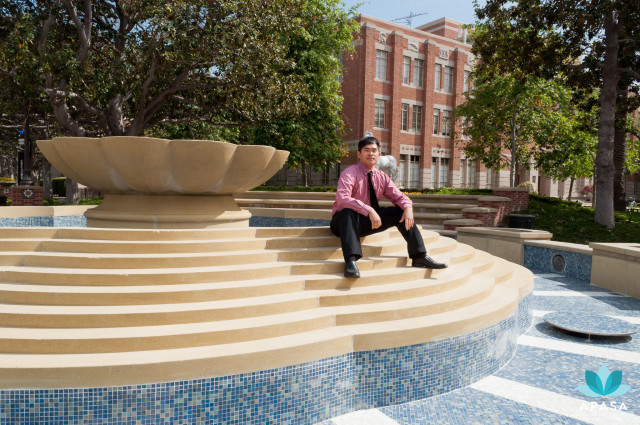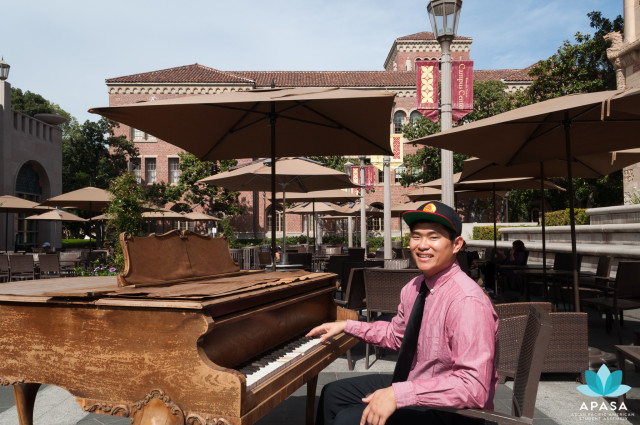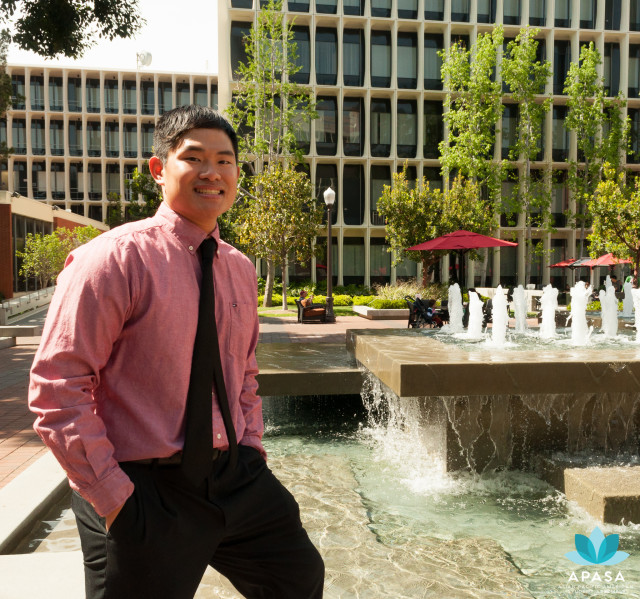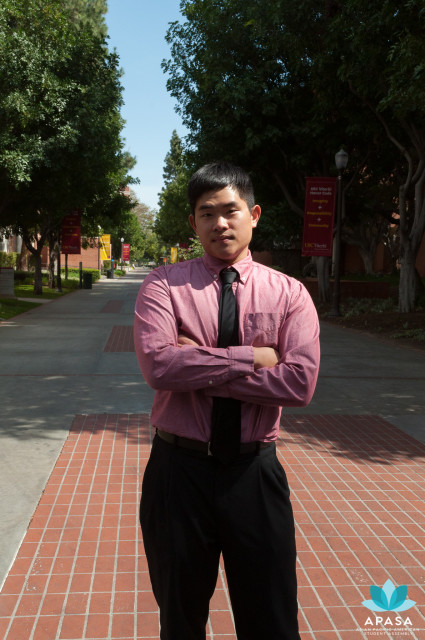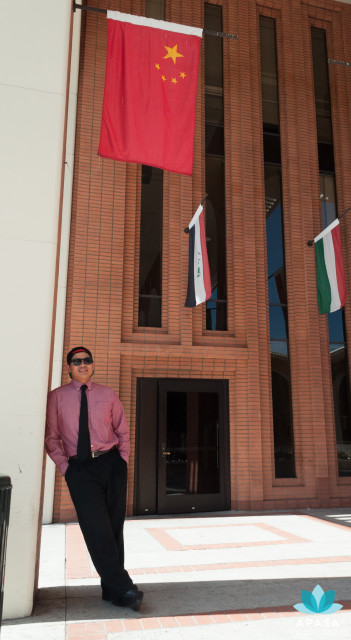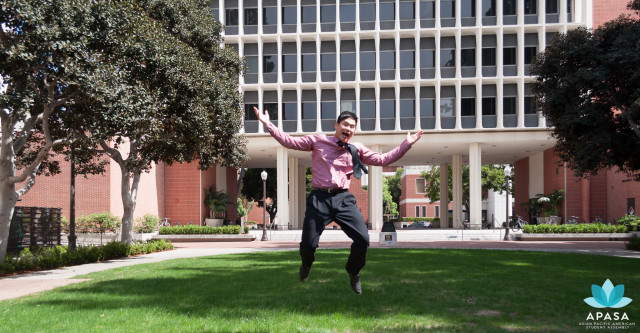APA Leaders 2016: Meet Jacky Chen
As always, we hope you all had a great weekend, and what better way to start off a week than with APA Leaders with our last but not least APA Leader for 2016, Jacky Chen! Jacky Chen's a leader and role model to the community. He has been a CIRCLE TA and an intern at the Asian Pacific American Dispute Resolution Center. Find out more about Jacky in the interview below: Name: Jacky Chen Major: Electrical Engineering Year: Senior Hometown: Phoenix, AZ
What does being APA mean to you?
Being APA meant next to nothing to me before USC. It’s not that I was ashamed of it; it’s just that I never really learned about it. I was born and raised in Phoenix and always attended schools where the majority was Hispanic or White. My high school was 2% Asian, my best friend is white, and so I always just thought of myself as American. My brothers and I fit in pretty well. We were some of the most well-known students in our high school of over 2000. One brother finished 3rd at Freshman State for wrestling and was nominated for Homecoming Court. Another one played on the basketball team, which had recently won a state championship. I was known for dancing hip hop and won voted as “Most likely to become a Billionaire”. We were known as the “Chen Dynasty” and our peers viewed and respected us as individuals. However, that changed when I came to USC.
The USC social environment forced the label of APA onto me and it came as an absolute shock. Before school even started, at band camp, I had my first racist experience where a fellow freshman trombone only invited the non-Asians to hang out at their house. During the first few weeks, as I introduced my name, Jacky Chen, one student immediately responded with, “Wait what? Dude, that’s kind of racist,” even after I explained that it was my real name. When talking about band, an APA friend told me that he could not see an Asian Drum Major representing USC within the next 40 years because of race. Later in the year, I was eating lunch in the dining hall with my white, frat friend when his friends came over and gave him a weird, almost confused glance. At first, I disregarded these and other similar experiences, shrugging them off as singular incidents linked only to the decisions of a few individuals. However, as freshman year came and went and the lone events changed to an evidence-backed trend, I began to realize just how real and deep this racism was. People didn’t even realize it existed because, unless they tried to be more aware, it was the default setting.
I think a lot of individual Asians Americans (and other minorities) realize that there is power that comes with being white and they see that the easiest and quickest way to gain that power is to become white-washed, trading a part of their identity for power. This is illustrated by an experience where I was hanging out with a friend who happened to be a white female. A little while later, an Asian American male, who was her friend, joined us. Later that night, after she had left, the friend, who was drunk, began talking to me and saying how hard it was. At first, I was confused. Then, he elaborated, “It’s so hard to date a white girl as an Asian guy. In high school, it took years for me to break into a white friend group and become able to date white girls.” As he said, a lot of time and effort is required to become recognized as “white”. Without really understanding what is being traded, it can seem like a great, easily justifiable deal. But once that “status” is attained, it is understood to be precious and must be defended and maintained, justifying disassociating oneself from the people of the same race, who might inadvertently strip that whiteness away. This builds on top of the, already existent, societal racism creating a rejection of one’s own race and tearing apart the APA community.
Only in the past few years have I begun to really recognize the APA identity. Even though it was forced on me, I wear it proudly. I’ve always strived to live honestly and I’ve realized that if I want to do that without any strategic disadvantages, I’ll have to create a world where I can be myself unapologetically. That’s exactly what I intend to do. I’ve always surprised the people that get the chance to know me. This time, I’ll have to do things big enough that the whole world will have to turn and watch. I look forward to the day that happens, when the world must stands there, awestruck and surprised. In the fighting words of Muhammad Ali, “I’m gonna show you how great I am!”
Explain in detail your involvement in the Asian Pacific American community on and off campus.
The majority of my involvement at USC has not been specifically in the APA community or the wider activist community, which is somewhat nonconforming for the APA Leader recognition. However, being non-conforming is representative of me and my story in general so I appreciate being recognized despite that. To efficiently explain what my involvements look like, I’ll list them out resume-style.
Work Experience 1. Southern California Edison, Intern 2. USC Viterbi ENGR-101, TA 3. Critical Issues in Race, Class, and Leadership (APASS CIRCLE), TA and Participant 4. Johns Hopkins Center for Talented Youth, TA 5. Asian Pacific American Dispute Resolution Center (Non-profit), Intern 6. Nuclear Safety Research, Researcher and writer 7. Blockwise Engineering, Intern
Extra-curricular/Leadership 1. Trojan Knights, Songfest Chair 2. First Generation College Student Conference, Planning Committee Member 3. Trojan Marching Band, Squad Leader 4. Redefining Engagement in Active Leadership (Office of Campus Activities), Coordinator 5. Institute of Electrical and Electronics Engineers (USC IEEE), Web Chair 6. ITASA West Coast Conference, Group Leader 7. Conferences/ Retreats: GLO Leadership, Posse Plus, Viterbi Trek, Advancing Justice
Volunteer Experience 1. Joint Education Program (JEP) 2. APASS PEER Mentoring Program 3. Trojan Knight Philanthropies a. Bone Marrow Drive, Spirits in Action, Swim with Mike, Knight's Carnival on Skid Row, Pumpkin Carving, Chalk the Block, Songfest Musical 4. Events a. Kicks for Kids, Friends and Neighbors Day, MESA College Day, Trojan Dance Marathon, Viterbi Ball Ticketing, Housing New Admits
Competition Experience 1. National Academy of Engineering Business Proposal Competition 2. Undergraduate Research Symposium, Researcher 3. National Academy of Engineering Video Competition, Director, Writer and Editor 4. Boeing Business Case Competition, Writer and Presenter 5. Hackathons: HackSC (USC), MHacks (Michigan), Intel IoT Hackathon, AngelHacks
Awards 1. Scholarships: Jerome Linn Scholarship, Robinson Scholarship, Phoenix Alumni Club 2. Undergraduate Research Associate's Program Grant 3. Accepted to 5 Year Master's in EE Computer Networks (Progressive Degree Program) 4. Tea with Nikias
Looking through my involvements throughout the years, only about 20% of them specifically fall into the “APA” category. I enjoyed these APA experiences a lot. However, I also spent a lot of time in different parts of USC because I hope to create a school-wide environment that provides space for people of all races and backgrounds. I think that the value of this is often overlooked because organizations at USC can be so demanding and, as a result, exclusive based on time and commitment. I want to stress the importance of trying new and different things in order to grow as an individual and increase effectiveness. Shout out to APASS’s CIRCLE program, do it if you haven’t already.
What kind of legacy do you want to leave at USC?
I want to leave a legacy that inspires and empowers others. Growing up with four younger siblings, I have found that the best thing I’ve been able to give them is the ability to help themselves. Often times, this ability is achieved through helping them believe both in themselves and in their dreams, which can often hover between the possible and impossible. The greatest leaders throughout history, no matter their goals, have all improved the people around them. They’ve lifted up their families, communities, and even nations and, by spreading individual empowerment on massive scales, they have been able to change the world.
This type of legacy is so incredible. Not only is it effective but it is quite literally supported by happiness and good. A 75-year long Harvard study tracked thousands of people throughout their lives and showed that the main factor for someone’s happiness is the strength of their relationships. By empowering others, an individual’s relationships with those people are strengthened. My best friend has told me time and time again how grateful he is to me for helping change his life and I could not ask for a better friend to have helped shaped mine. This brings it back to the idea of helping people believe in themselves and creating good in the world. When people are empowered, their confidence and awareness also rise. Awareness leads to empathy for others and confidence helps people act to change what they do not like in the world. If they choose to help, it can easily come in the form of empowering others which perpetuates the cycle.
Tell us how you got here. How did you first get involved with the APA community?
I was originally rejected from USC. My high schools was not very good and never really sent anyone to good schools so I had no idea what I was getting myself into when I started “trying” my senior year of high school. I was devastated when I was rejected by seven of the eight schools, only getting into ASU. USC was the only rejection that noted that it was possible to appeal. Even after getting in, I wasn’t sure if I’d be going here. My late acceptance offer meant I got my financial aid package in July. By that time, it seemed like all the aid money was gone because that first year deal was terrible. Despite that, my dad had me attend freshman orientation and, there, I met two amazing people who convinced me that USC was worth it. One directed USC’s Political Student Assembly and the other received the APA leader nomination last year. So that’s how I got here.
I first got involved in the APA community by participating in CIRCLE during my first semester. I thought it was a good program but also felt relatively disconnected from most of my fellow participants who I honestly couldn’t relate to. A theme that I have felt at USC is that, for the first time, I’ve been surrounded by people that look like me but almost no one who is actually like me or comes from a background like mine, and that theme was felt in CIRCLE as well. I didn’t even attend the retreat at the end, partly because I chose to go to the USC vs. UCLA game with the marching band instead. Jonathan Wang was a big part of why I continued to participate in the community. I remember running into him on Trousdale and being encouraged to apply for the TIE internship. Andy Su was also very encouraging and he was a fellow trombone in the marching band so that helped. A few amazing people and little things like that gave me a reason to continue participating in the APA community, discover more of myself, and eventually become someone that can help others in the community. I’ve always sought out great people above all else. Even if I am unsure of what the next step will be, putting myself with great people has always been the right move. Great people convinced me to come to USC, welcomed me into these communities, and encouraged me to empower myself.
What would be one change you would like to see at USC? In the APA community?
This question really ties into the legacy of empowerment. The first part was helping people believe in themselves and the second is helping them believe in their dreams. Dreams are often already difficult to achieve but the challenges become that much harder when reality hits you with things like racism and sexism. Therefore, I would like to see the social environment of USC become a place where, in each social interaction, people judge and treat each other as individuals, defined by real actions, rather than stereotypes. This would help both sides. It is not prudent to treat people based on preconceived notions that have no basis in the individual so this environment would teach “judgers” how to effectively interact with others. As the “judged”, it is disempowering and exhausting to always have to carry the weight of stereotypes. Often, before they can be accepted as a “normal”, “square one” human being, the judged must prove that the stereotypes do not apply to themselves. This ties into the motivation for why people want to be whitewashed, because it empowers them to be anything without being tied to a specific race, and why minorities often choose to hang out with members of their own race because they are not judged as much. By spreading this mindset to all individuals at USC, we enable everyone to be comfortable being themselves which is so basic but important.
I mention this issue of identity and stereotypes because I think it has a huge effect on the APA community but it is often not recognized in general society. We are scapegoated as the model minority, used as a tool to point blame at other minority groups. This damages solidarity in the minority community. Population wise, we are smaller than some of the other minority groups. We are also newer and have had less time to create connections in society. Many Asian countries have gone through wars and turmoil in the past few decades. We don’t have Black Pride or native ties to the Americas and there is a lack of a strong voice in the APA community. Our group, in general, is stereotyped as submissive, socially awkward, lacking power, and more feminine and less masculine. In my life time, Chinese has gone from a language that my parents did not want me to learn to a language that is highly valued by society.
During my freshman year, I had the chance to get a book signed by David Henry Hwang, a celebrated playwright. In the brief seconds that we chatted, I mentioned that I thought it was cool that he was doing a piece on Bruce Lee and Asian masculinity and he responded with, “Yeah, it’s hard being an Asian guy.” At the time, it seemed like a funny statement for him to make but, over the years, I’ve seen how true that is. Between an Asian male friend that had been adopted by white parents, loudly repeating to me, “Dude, I’m not Asian,” and more violent events such as one Asian American yelling Asian slurs and throwing raw eggs at another Asian or the Santa Barbara shootings committed by a half-white, half-Asian college student who struggled with his masculinity. Society’s stereotypes has created self-hatred for Asian males and I hope to see our community overcome that by bringing it back to valuing individuals as such.
What motivates and inspires you?
People. Amazing people. An individual’s ability to change. Humanity’s ability to change. The ability to dream and achieve well beyond one’s current situation. Great awareness, empathy, and humanity. Well-planned and well-executed decisions. Drive and fighting spirit. The future and the gems it holds. Space travel. Immortality. The people who believe in and support me. The list goes on and on but I think the things that inspires me the most are the incredible, near-impossible things that people do. My greatest motivation is achieving the “impossible” for the people who believe in my ability to do so and to set the bar as high as possible for someone like me. Achieving the impossible is a great feeling and it gives people hope. It’s almost like magic, no one expects this amazing thing to happen because they don’t think it’s possible but then it does and some of them will start to ask, “Why can’t I do that?”
I am also inspired and motivated by individuals who stand out as anomalies in society. People are largely lazy and stupid but, sometimes, certain individuals can be surprising. That’s how I choose my closest friends. I observe people and get to know them and their background. From there, I set an expectation for how great of a person they are and, there is something pretty special about the ones who can greatly exceed this expectation. So yeah, great friends and achieving the “impossible” inspire and motivate me.
There have been so many times in my life when someone older than me, who I respect, has told me something cannot be done because that’s just how it is. The thing is, we’re living in an amazing generation. If you think the past century went by fast, wait until you see what’s coming this century. The greatest marvels of humanity are before us. Young people are growing up in a world like never before, where everything is constantly changing, where people all over are becoming empowered and doing amazing things no matter what their background is. Look at politics today, someone like Bernie Sanders, who is so optimistic, almost to a fault, is getting huge amounts of support. People would’ve said that someone like him or Donald Trump could not succeed in this election. People are wrong all the time. Young people want to dream and believe in their dreams. They believe they can make them a reality. Older people are saying, no you have to take it slower because that’s not how the world works.
All money aside, what is your dream job?
I believe that we are facing an epidemic in which people don’t really know why they do the things they do in life anymore. This is already a glaring issue in college. I was having coffee with the Vice Provost of Undergraduate Programs and he told me about a book which said that so many kids in elite, higher institutions today don’t know how to live in real life. One astute friend of mine noted how boring everyone was at USC because so many of them are prepped and guided to their current situation. At Johns Hopkins’ summer program, I saw so many adults who were just dissatisfied with their lives. It’s just really sad overall and I think it comes down to the fact that people are not fully aware of why they are making decisions. They don’t own the decisions or grow from them. Life is so easy now that it is easy to get away with being lazy. I think laziness or apathy is an easy excuse but what’s laying behind it is often fear: fear of failure, fear of one’s own inability, fear of the unknown. My dream job is to solve this epidemic.
Anyone you’d like to thank or give a shoutout to?
I’d like to thank my family, especially my siblings. I’d like to thank my friends. I’d like to thank USC, its programs, and student orgs. Lastly, I’d like to invite anyone who wants to talk or become friends with me to reach out.
We would like to take this time to thank Jacky Chen and all of our other APA Leaders this year for their cooperation and their unceasing involvement in the APA community. With this, APA Leaders is coming to a close along with most of APAHF. Make sure to check out the other APA Leaders in the past blog posts and make sure to also nominate a professor that has inspired you or changed your life for Professors of Color here: http://goo.gl/forms/6o56x0F8Wh

